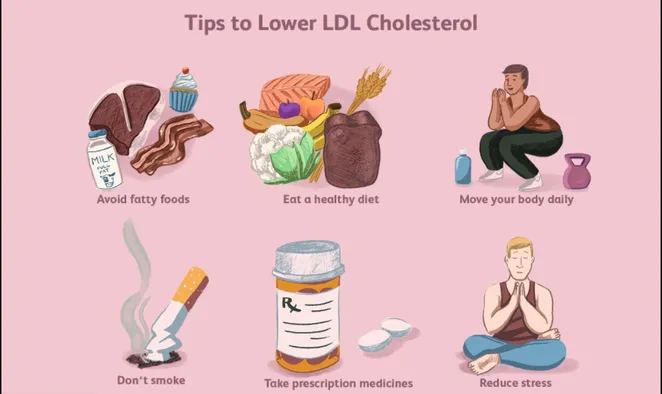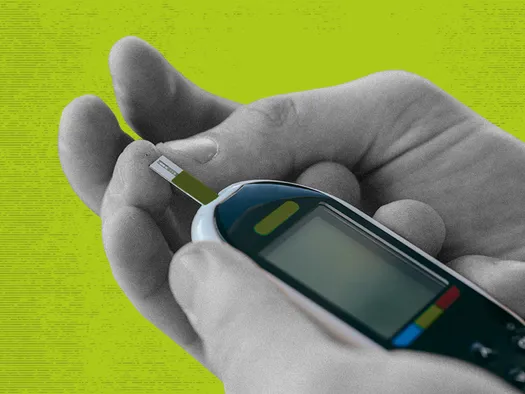High cholesterol, a well-known health condition among Americans, is on the decline but remains a threat. The percentage of U.S. adults suffering from high cholesterol dropped by an impressive 6% between 2000 and 2016, from 18.3% down to just 12%.
This is a step in a positive direction, but higher-than-recommended cholesterol is still a serious condition and prevention depends on a thorough understanding of its causes. High cholesterol is a key risk factor for heart disease and remains the leading cause of death in the United States.

High cholesterol is largely governed by lifestyle factors like diet, exercise, and smoking — and that means it’s both treatable and preventable.
Why is LDL called the “bad” cholesterol?

LDL is called the “bad” cholesterol because it can cause a buildup of fat and cholesterol in the walls of your blood vessels. If your LDL has been high for many years, this buildup can clog the arteries to your heart or brain.
The arteries may be partly or totally blocked. The medical word for this blockage is “atherosclerosis.” Clogged arteries to the heart can cause a heart attack. Clogged arteries to the brain can cause a stroke.
What are normal cholesterol levels?
A normal total cholesterol level is less than 200. A normal LDL level is less than 130. A normal HDL level is higher than 35.
A high HDL level is better. An HDL level higher than 60 is the best. HDL is called the “good” cholesterol because it helps remove cholesterol from your body. In this way, HDL helps prevent heart disease and stroke. Regular exercise is a good way to increase your HDL level.
If your total cholesterol level is 200 to 239, you have a borderline level. The word “borderline” is used because levels of 200 to 239 are close to being high. A total cholesterol of 240 or above is a high level.
If your LDL level is 130 to 159, you have a borderline level. If your LDL level is 160 or higher, you have a high level.
Who should get a cholesterol test?
According to the National Heart, Lung and Blood Institute (NHLBI), a person’s first cholesterol screening should occur between the ages of 9 and 11 and then be repeated every five years after that.
The NHLBI recommends that cholesterol screenings occur every 1 to 2 years for men ages 45 to 65 and for women ages 55 to 65. People over 65 should receive cholesterol tests annually.
More-frequent testing might be needed if your initial test results were abnormal or if you already have coronary artery disease, you’re taking cholesterol-lowering medications or you’re at higher risk of coronary artery disease because you:
- Have a family history of high cholesterol or heart attacks
- Are overweight
- Are physically inactive
- Have diabetes
- Eat an unhealthy diet
- Smoke cigarettes
People undergoing treatment for high cholesterol require regular cholesterol testing to monitor the effectiveness of their treatments.
Are home cholesterol testing kits accurate?

The answer is yes if the tests are labeled “CDC-certified.” This means that the contents have been approved by the Cholesterol Reference Method Laboratory Network, a group that works with test makers, laboratories and the Centers for Disease Control and Prevention (CDC) to make sure tests are accurate.
For home tests, you will still need to fast for 12 hours and to obtain blood for testing. Some kits come with packages for mailing to a lab for results. Other kits have a monitor so you can get the results at home. The cost of such home kits varies.
How can I reduce my LDL and total cholesterol levels?
Eating a low-fat, heart-healthy diet is a good start. Eat more chicken, turkey and fish. Drink fat free milk instead of whole milk. Avoid other high-fat dairy foods like cheese, butter and ice cream. Avoid fried foods. Eat lots of fresh fruits and vegetables.
What about taking a drug to reduce my cholesterol level?
If you stay on a low-fat diet for three to six months but still have not reached your goal, talk to your doctor about taking a medicine to reduce your cholesterol level.
When you take a cholesterol-lowering medicine, try to take it every day at about the same time. The drop in your cholesterol level caused by the drug lasts only one or two days after you stop taking the medicine.
Be sure to tell your doctor about any changes in your body that might be a side effect from the medicine. Also, talk to your doctor if you are worried about taking the medicine.
If the cholesterol medicine does not help reduce your LDL level enough after several months of treatment, your doctor may increase the dose. Changing to a different cholesterol medicine can also help.
Another way to make the cholesterol medicine work would be to add a second medicine to your treatment. Your doctor can try different treatments to find which one works for you. Even if you are taking a medicine to lower your cholesterol, it’s still important to follow a heart-healthy diet.

